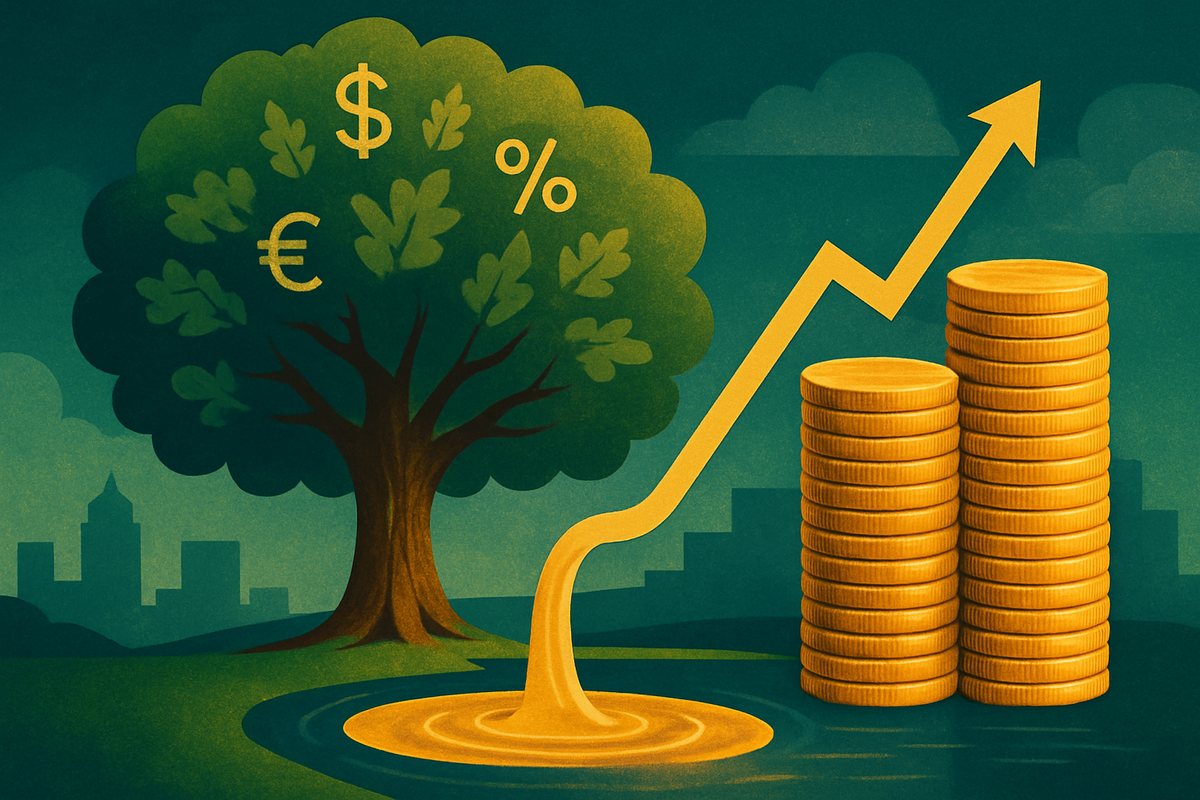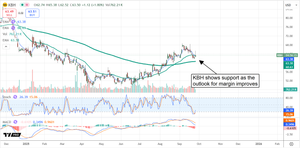
In an investment landscape increasingly characterized by uncertainty and a persistent search for stable returns, a compelling narrative is emerging around high-dividend stocks. Specifically, an 8% dividend yield, once viewed with skepticism, is now being highlighted by analysts as a potential market-beater. This isn't merely about income; it's about identifying robust companies that offer both substantial cash payouts and the underlying financial strength to deliver capital appreciation, even as broader market indices grapple with fluctuating sentiments. As of September 2025, one such prominent example capturing significant attention is Legal & General (LSE: LGEN), a diversified financial services giant whose attractive 8.8% dividend yield is signaling more than just income – it's suggesting a strong contender for overall market outperformance.
The allure of an 8% dividend yield in today's market is multifaceted. With inflation concerns lingering and interest rates potentially stabilizing at elevated levels, investors are increasingly pivoting towards assets that offer tangible returns and a hedge against volatility. This focus on income-generating assets, coupled with a rigorous evaluation of underlying company fundamentals, is driving the bullish forecasts for select high-dividend payers. The expectation is that these companies, often mature and cash-generative, can provide a cushion against market downturns while still participating in upside growth, making them particularly attractive in the current economic climate.
The Resurgence of Income: Legal & General Leads the Charge
The expectation that a high-dividend stock like Legal & General (LSE: LGEN) could beat the market is rooted in a combination of factors: its robust financial health, strategic positioning, and a market environment increasingly valuing stable income. As of September 2025, Legal & General's impressive 8.8% dividend yield isn't an anomaly but rather a reflection of its consistent free cash flow generation and commitment to shareholder returns. The company operates across various segments, including insurance, asset management, and retirement solutions, providing a diversified revenue stream that underpins its dividend sustainability. Analysts point to its strong capital position and prudent risk management as key elements that distinguish it from potential "dividend traps" – companies whose high yields are unsustainable.
The timeline leading up to this moment has seen a gradual shift in investor sentiment. Following periods of rapid growth in speculative assets, the market has matured, and the emphasis has moved towards fundamental value. The sustained interest in defensive sectors and income-generating investments has bolstered the appeal of companies like Legal & General. Its consistent performance, even through varying economic cycles, has built a track record that instills confidence. Key players involved in this bullish forecast include financial analysts from various institutions who have upgraded their ratings and reiterated "buy" recommendations, citing the company's strong balance sheet, predictable cash flows, and attractive valuation relative to its peers. Initial market reactions have shown a steady accumulation of shares in such high-yield, fundamentally sound companies, indicating a broader trend of capital flowing into income-focused strategies.
Furthermore, Legal & General's strategic initiatives, particularly in areas like defined benefit pension transfers and bulk annuities, have demonstrated resilience and growth potential. These long-term contracts provide stable, recurring revenue, which is critical for supporting a high and sustainable dividend. The company's asset management arm also benefits from scale and a diverse client base, contributing to its overall financial stability. This blend of defensive characteristics and targeted growth strategies positions Legal & General not just as an income play, but as a total return opportunity, with the dividend acting as a significant component of that return, expected to drive outperformance against broader market benchmarks.
Navigating the Financial Landscape: Winners and Losers
The anticipated outperformance of a high-dividend stock like Legal & General (LSE: LGEN) has significant implications for various players within the financial services sector and beyond. Legal & General itself stands as a clear potential winner. Its ability to maintain an 8.8% dividend yield, backed by strong fundamentals and strategic growth, enhances its attractiveness to a broad spectrum of investors, from individual income seekers to institutional funds. A rising stock price, coupled with the generous dividend, could lead to increased market capitalization, improved investor confidence, and potentially lower cost of capital for future growth initiatives. This positive momentum could further solidify its position as a market leader in insurance, asset management, and retirement solutions, allowing it to expand its market share and pursue strategic acquisitions more effectively.
Conversely, competitors within the financial services industry might face increased pressure. Other insurers and asset managers that offer lower dividend yields or demonstrate less robust financial stability could see capital migrate away from their stocks towards more attractive alternatives like Legal & General. Companies with higher debt loads or less diversified revenue streams might struggle to compete for investor attention if the market continues to prioritize dividend sustainability and strong balance sheets. This could force some to re-evaluate their capital allocation strategies, potentially increasing their own dividend payouts or focusing more intensely on cost efficiencies and growth drivers to remain competitive. For instance, while other UK financial institutions like Aviva (LSE: AV) or Prudential (LSE: PRU) also offer dividends, the sheer size and perceived sustainability of LGEN's payout, combined with positive analyst sentiment, could create a competitive advantage in attracting income-focused investment.
Beyond direct competitors, the ripple effect extends to other sectors. A successful high-dividend strategy exemplified by Legal & General could influence broader investment trends, potentially drawing capital away from growth stocks or lower-yielding defensive plays. This shift could impact companies across various industries that rely on different investor profiles. Furthermore, the strong performance of a major institutional investor like Legal & General could indirectly benefit its clients and partners, including corporate pension schemes and individual policyholders, through enhanced financial stability and potentially better returns on their investments managed by LGEN's asset management arm. This reinforces the idea that LGEN's success is not isolated but part of a larger ecosystem of financial interconnectedness.
Broader Significance: A Return to Value and Income
The anticipated outperformance of high-dividend stocks, exemplified by Legal & General (LSE: LGEN), signifies a broader recalibration within the financial markets. This event fits squarely into the overarching industry trend of a renewed focus on value investing and income generation, especially prevalent in a period marked by elevated inflation, higher interest rates, and geopolitical uncertainties. Investors are increasingly seeking tangible returns and stability, moving away from the speculative growth narratives that dominated previous cycles. The demand for consistent cash flows, which high-dividend payers reliably provide, acts as a defensive mechanism against market volatility and as a crucial component of total return in a lower-growth environment. This trend underscores a shift towards more traditional, fundamentally driven investment strategies.
The potential ripple effects on competitors and partners are substantial. If high-dividend strategies continue to gain traction, it could compel other financial institutions and even companies in unrelated sectors to re-evaluate their capital allocation policies. Firms might be pressured to enhance their own dividend payouts, improve free cash flow generation, or strengthen their balance sheets to attract and retain investors. This could lead to a more disciplined corporate environment focused on sustainable profitability and shareholder returns. For partners, particularly those in the pension and asset management space, working with financially robust and dividend-generative entities like Legal & General offers stability and potentially higher returns on their managed assets, reinforcing existing relationships and attracting new ones.
Regulatory or policy implications, particularly in the financial services sector, are also worth considering. While not directly tied to dividend policy, the stability and strong capital positions of companies like Legal & General are often a result of stringent regulatory oversight (e.g., Solvency II in Europe, which applies to LGEN). Regulators encourage robust balance sheets and prudent risk management, which indirectly support sustainable dividend payouts. Any future policy shifts impacting capital requirements or investment mandates could influence how financial institutions manage their dividends. Historically, periods of high interest rates and economic uncertainty have often seen a flight to quality and income, with dividend-paying stocks often outperforming. The current environment echoes these historical precedents, suggesting that the focus on high-yield, fundamentally sound companies is a well-trodden path for investors seeking resilience and returns.
What Comes Next: Navigating the Evolving Market
Looking ahead, the trajectory for high-dividend stocks like Legal & General (LSE: LGEN) presents a mix of short-term stability and long-term strategic evolution. In the short term, continued market volatility and the prevailing interest rate environment are likely to sustain investor appetite for income-generating assets. This suggests that LGEN, with its attractive 8.8% dividend yield and solid fundamentals, could continue to see strong demand, potentially driving further capital appreciation in addition to its generous payout. However, investors must remain vigilant for any shifts in economic forecasts, such as a significant downturn that could impact the broader financial sector or a sharp reversal in interest rate policy, both of which could influence dividend sustainability.
In the long term, the financial services sector, including companies like Legal & General, will need to adapt to evolving demographic trends and technological advancements. The aging global population continues to drive demand for retirement solutions and wealth management, areas where LGEN has a strong footprint. Strategic pivots may include further investments in digital transformation to enhance customer experience and operational efficiency, as well as exploring new markets or product offerings. The integration of AI and data analytics could also provide a competitive edge in risk assessment and personalized financial planning. These adaptations are crucial for ensuring the continued sustainability of high dividends and long-term growth.
Market opportunities may emerge from a continued flight to quality, potentially leading to increased inflows into well-managed, dividend-paying companies. Challenges could arise from intensified competition, regulatory changes, or unforeseen economic shocks. Potential scenarios range from a continued steady outperformance where LGEN acts as a cornerstone of income-focused portfolios, to scenarios where broader market shifts necessitate a re-evaluation of its growth prospects. Investors should closely monitor LGEN's earnings reports, free cash flow generation, and any strategic announcements regarding acquisitions or divestitures, as these will be key indicators of its ability to sustain its dividend and deliver market-beating returns.
A Steady Anchor in Turbulent Seas: Final Thoughts for Investors
The emergence of a high-dividend stock, such as Legal & General (LSE: LGEN) with its compelling 8.8% yield, as a strong contender to beat the market represents a significant shift in investment priorities. The key takeaway is that in an era defined by economic uncertainty and a renewed emphasis on tangible returns, fundamentally sound companies capable of sustaining substantial dividend payouts are becoming indispensable components of diversified portfolios. This isn't merely about chasing yield; it's about identifying robust businesses with strong cash flow generation, healthy balance sheets, and strategic positioning that allows them to thrive even when broader market conditions are challenging.
Moving forward, the market is likely to continue favoring companies that offer a blend of income and stability. Legal & General's strong performance, if sustained, could serve as a blueprint for other investors seeking similar opportunities. The lasting impact of this trend could be a more balanced investment landscape, where the allure of growth is tempered by the foundational strength of value and income. This could lead to a more resilient market overall, less prone to speculative bubbles and more focused on sustainable corporate performance.
Investors should watch for several critical indicators in the coming months. These include continued strength in free cash flow generation across high-dividend payers, stability in their payout ratios, and any shifts in analyst sentiment or macroeconomic conditions that could impact their ability to maintain dividends. Furthermore, monitoring the broader interest rate environment will be crucial, as sustained high rates tend to make fixed-income alternatives more competitive, potentially putting pressure on equity dividend yields. Ultimately, while the promise of an 8% dividend beating the market is enticing, thorough due diligence and a long-term perspective remain paramount for navigating the complexities of the financial markets.
This content is intended for informational purposes only and is not financial advice.





